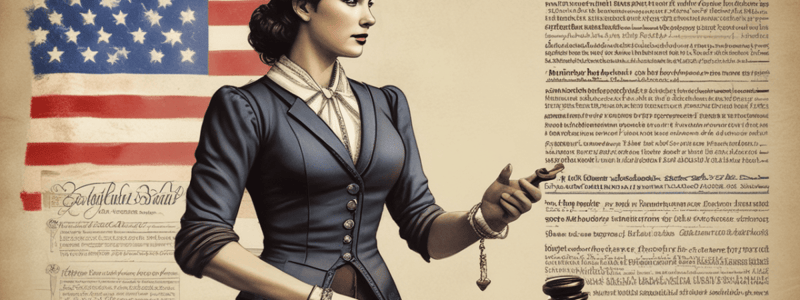Podcast
Questions and Answers
What happens if a suspect invokes the right to remain silent after being Mirandized?
What happens if a suspect invokes the right to remain silent after being Mirandized?
- Police may resume questioning after a significant period of time, if the suspect is reminded of the Miranda rights. (correct)
- Police may resume questioning immediately.
- The suspect's statement is inadmissible in court.
- The suspect is released from custody.
What is required when a suspect invokes their Miranda rights but later reinitiates communication?
What is required when a suspect invokes their Miranda rights but later reinitiates communication?
- The officer must re-read the Miranda rights to the suspect.
- The suspect is taken into custody again.
- The suspect is released from custody.
- The officer must remind the suspect of their Miranda rights. (correct)
What is referred to as questioning initiated by law enforcement officers?
What is referred to as questioning initiated by law enforcement officers?
- Arrest
- Interrogation (correct)
- Mirandization
- Custody
What is an example of a routine booking question that does not constitute interrogation?
What is an example of a routine booking question that does not constitute interrogation?
What happens if a suspect makes an uncoerced statement to the police after being Mirandized?
What happens if a suspect makes an uncoerced statement to the police after being Mirandized?
What is the term for words or actions on the part of the police that should reasonably expect to elicit an incriminating response?
What is the term for words or actions on the part of the police that should reasonably expect to elicit an incriminating response?
What is the criteria used by the Court to determine whether Miranda applies?
What is the criteria used by the Court to determine whether Miranda applies?
What happens if a suspect has been brought into custody on one criminal charge and waives their Miranda rights?
What happens if a suspect has been brought into custody on one criminal charge and waives their Miranda rights?
What is not considered an interrogation?
What is not considered an interrogation?
What is the case that ruled that a suspect who initiated a new conversation about two hours after invoking their right to remain silent, and was reminded of their Miranda rights, made an admissible statement?
What is the case that ruled that a suspect who initiated a new conversation about two hours after invoking their right to remain silent, and was reminded of their Miranda rights, made an admissible statement?
When can a court conclude that the Miranda rights have been waived?
When can a court conclude that the Miranda rights have been waived?
What happens if the accused indicates they wish to consult with an attorney during an interrogation?
What happens if the accused indicates they wish to consult with an attorney during an interrogation?
Can the accused terminate an interrogation at any stage?
Can the accused terminate an interrogation at any stage?
What happens if the accused initiates further communication with the police after invoking their right to counsel?
What happens if the accused initiates further communication with the police after invoking their right to counsel?
What is the ruling in the Minnick v. Mississippi case?
What is the ruling in the Minnick v. Mississippi case?
What happens after a 14-day break in custody?
What happens after a 14-day break in custody?
What constitutes an unequivocal request for counsel?
What constitutes an unequivocal request for counsel?
What happens if the accused invokes their right to remain silent?
What happens if the accused invokes their right to remain silent?
When can a confession or admission obtained during custodial interrogation be excluded?
When can a confession or admission obtained during custodial interrogation be excluded?
What is the ruling in the Davis v. U.S. case?
What is the ruling in the Davis v. U.S. case?
What is the requirement for police after reading a suspect their Miranda rights?
What is the requirement for police after reading a suspect their Miranda rights?
What is the outcome if a suspect's un-Mirandized statements are voluntary?
What is the outcome if a suspect's un-Mirandized statements are voluntary?
What is the two-step interview technique?
What is the two-step interview technique?
What is the effect of an illegal arrest on subsequent confessions or admissions?
What is the effect of an illegal arrest on subsequent confessions or admissions?
What is the outcome if an uncorroborated confession is obtained by a law enforcement officer?
What is the outcome if an uncorroborated confession is obtained by a law enforcement officer?
What is the effect of a Miranda interrogation by police after the person signs a claim of rights form at or shortly before a first appearance hearing?
What is the effect of a Miranda interrogation by police after the person signs a claim of rights form at or shortly before a first appearance hearing?
How can a defendant show that their statement was involuntary?
How can a defendant show that their statement was involuntary?
What is the rationale behind the requirement that police make a good faith effort to answer any bona fide questions a suspect may ask after being read their Miranda rights?
What is the rationale behind the requirement that police make a good faith effort to answer any bona fide questions a suspect may ask after being read their Miranda rights?
What is the significance of the case of Almeida v. State?
What is the significance of the case of Almeida v. State?
What is the outcome if the police use a two-step interview technique?
What is the outcome if the police use a two-step interview technique?
What is the primary right guaranteed to an accused person under the Fifth Amendment?
What is the primary right guaranteed to an accused person under the Fifth Amendment?
What is the term used to describe questioning initiated by law enforcement officers after a person has been taken into custody or otherwise deprived of his freedom of action in any significant way?
What is the term used to describe questioning initiated by law enforcement officers after a person has been taken into custody or otherwise deprived of his freedom of action in any significant way?
What is the significance of the Florida v. Powell case in 2010?
What is the significance of the Florida v. Powell case in 2010?
What is the requirement for a waiver of Miranda rights to be valid?
What is the requirement for a waiver of Miranda rights to be valid?
What is one of the factors considered by the court in determining the validity of a waiver of Miranda rights?
What is one of the factors considered by the court in determining the validity of a waiver of Miranda rights?
What is the purpose of giving a suspect the Miranda warning?
What is the purpose of giving a suspect the Miranda warning?
What is the significance of the Ramirez v. State case in 1999?
What is the significance of the Ramirez v. State case in 1999?
What happens if a suspect waives their Miranda rights?
What happens if a suspect waives their Miranda rights?
What is a factor that a court considers when determining the voluntariness of a juvenile's confession?
What is a factor that a court considers when determining the voluntariness of a juvenile's confession?
What is required of a person taking a child into custody?
What is required of a person taking a child into custody?
What is the consequence if a juvenile indicates to police that they do not wish to speak to them until they have had an opportunity to speak with their parents?
What is the consequence if a juvenile indicates to police that they do not wish to speak to them until they have had an opportunity to speak with their parents?
Is there a constitutional requirement that police notify a juvenile's parents prior to questioning the juvenile?
Is there a constitutional requirement that police notify a juvenile's parents prior to questioning the juvenile?
What happens if the child is delivered to a juvenile probation officer before the parent, guardian, or legal custodian is notified?
What happens if the child is delivered to a juvenile probation officer before the parent, guardian, or legal custodian is notified?
What is required of a parent or guardian after being notified of their child's custody?
What is required of a parent or guardian after being notified of their child's custody?
What is the consequence of an officer's failure to contact a juvenile's foster parents?
What is the consequence of an officer's failure to contact a juvenile's foster parents?
What is considered in determining whether a juvenile's waiver of Miranda rights was voluntary?
What is considered in determining whether a juvenile's waiver of Miranda rights was voluntary?
What is the rule regarding imprisonment and Miranda warnings?
What is the rule regarding imprisonment and Miranda warnings?
What is the consequence of a juvenile's request to speak with their parents prior to giving a statement?
What is the consequence of a juvenile's request to speak with their parents prior to giving a statement?
When can a prisoner be questioned about events unrelated to his incarceration without being read Miranda warnings?
When can a prisoner be questioned about events unrelated to his incarceration without being read Miranda warnings?
At what stage of the criminal justice process does the Sixth Amendment right to counsel attach?
At what stage of the criminal justice process does the Sixth Amendment right to counsel attach?
What is the difference between the Sixth Amendment right to counsel and the Miranda Fifth Amendment right to counsel?
What is the difference between the Sixth Amendment right to counsel and the Miranda Fifth Amendment right to counsel?
What happens if a suspect is questioned about an offense that is factually related to the offense for which the Sixth Amendment right has attached?
What happens if a suspect is questioned about an offense that is factually related to the offense for which the Sixth Amendment right has attached?
What is required for a valid waiver of the Sixth Amendment right to counsel?
What is required for a valid waiver of the Sixth Amendment right to counsel?
When can police 'deliberately elicit' incriminating statements from a suspect?
When can police 'deliberately elicit' incriminating statements from a suspect?
What happens if a suspect is questioned about an offense for which the Sixth Amendment right to counsel has attached?
What happens if a suspect is questioned about an offense for which the Sixth Amendment right to counsel has attached?
What is the significance of the initiation of the prosecution in the context of the Sixth Amendment right to counsel?
What is the significance of the initiation of the prosecution in the context of the Sixth Amendment right to counsel?
What renders a subsequent statement involuntary in Fulmionte, 499 U.S. 279 (1991)?
What renders a subsequent statement involuntary in Fulmionte, 499 U.S. 279 (1991)?
In Lynumm v. Illinois, 372 U.S. 528 (1963), what made the defendant's confession involuntary?
In Lynumm v. Illinois, 372 U.S. 528 (1963), what made the defendant's confession involuntary?
What is the result of obtaining a confession as a result of a direct or implied promise of benefit or leniency?
What is the result of obtaining a confession as a result of a direct or implied promise of benefit or leniency?
In Samuel v. State, 905 So.2d 271 (Fla. 4th DCA 2005), what did the officer do to render the defendant's subsequent statements involuntary?
In Samuel v. State, 905 So.2d 271 (Fla. 4th DCA 2005), what did the officer do to render the defendant's subsequent statements involuntary?
What can police use to obtain a Miranda waiver?
What can police use to obtain a Miranda waiver?
In U.S. v. Patone, 542 U.S. 630 (2004), what was held to be admissible?
In U.S. v. Patone, 542 U.S. 630 (2004), what was held to be admissible?
In New York v. Quarles, 467 U.S. 649 (1984), what was not required before asking the suspect 'Where's the gun?'?
In New York v. Quarles, 467 U.S. 649 (1984), what was not required before asking the suspect 'Where's the gun?'?
What was the situation in Benson v. State, 698 So.2d 333 (Fla. 4th DCA 1998)?
What was the situation in Benson v. State, 698 So.2d 333 (Fla. 4th DCA 1998)?
What is the result of a confession obtained through a direct or implied promise of benefit or leniency?
What is the result of a confession obtained through a direct or implied promise of benefit or leniency?
What can render a defendant's statement involuntary?
What can render a defendant's statement involuntary?
Study Notes
Miranda Rights
- In Miranda v. Arizona (1966), the Supreme Court ruled that under the Fifth Amendment, an accused person has the right to remain silent and the right to an attorney during custodial interrogation.
- Custodial interrogation is defined as questioning initiated by law enforcement officers after a person has been taken into custody or otherwise deprived of their freedom of action in any significant way.
Administration of Miranda Rights
- The accused must be warned that they have the right to remain silent and that any statement they make can and will be used against them in a court of law.
- The accused must also be informed of their right to have an attorney present during questioning.
- The warning given must convey that the suspect has the right to have an attorney present not only at the outset of interrogation but also at all times (Florida v. Powell, 559 U.S. 50 (2010)).
Waiver of Miranda Rights
- The accused may waive their Miranda rights, but the waiver must be made voluntarily, knowingly, and intelligently.
- The court will examine the totality of the circumstances surrounding the waiver, including:
- The manner in which the Miranda rights were administered.
- The suspect's age, experience, background, and intelligence.
- Whether the suspect was given a chance to contact their parents (if a juvenile).
- Whether the questioning occurred in the station house.
- Whether the police secured a written waiver from the suspect at the outset of the interrogation.
Invocation of Right to Counsel
- If the accused indicates in any manner, and at any stage of the interrogation, that they wish to consult with an attorney, questioning must cease immediately (the "Edwards Rule").
- The accused may invoke their right to counsel even after making some statements (Edwards v. Arizona, 451 U.S. 477 (1981)).
- If the accused initiates further communication with the police, the interrogation cannot be reinitiated (Wilder v. State, 40 So. 3d 804 (Fla. 1st DCA 2010)).
Invocation of Right to Remain Silent
- If the accused invokes their right to remain silent, police may resume questioning after a significant period of time, if the accused is reminded of their Miranda rights.
- The questioning should concern a different topic than the earlier questioning.
Un-Mirandized Statements
- Voluntary, un-Mirandized statements made by the accused may be admissible in court, even if made after the Miranda rights are read.
- However, police may not circumvent the Miranda requirement by using a "two-step" interview technique.
Admissibility of Confessions
- A confession obtained as a result of a direct or implied promise of benefit or leniency is involuntary and inadmissible.
- A confession obtained through deception or misinformation is also involuntary and inadmissible.
- However, merely informing the defendant of realistic penalties for the offense under investigation will not render a subsequent confession inadmissible.
Juveniles
- In determining whether a juvenile's waiver of Miranda rights was voluntary, a court will consider:
- The methodology employed to administer the Miranda rights.
- The age, experience, background, and intelligence of the child.
- Whether the parents were contacted and whether the child had an opportunity to speak with them prior to giving the statement.
- Whether the questioning occurred in the station house.
- Whether the child executed a written waiver of rights.
- There is no constitutional requirement that police notify a juvenile's parents prior to questioning the juvenile.### Juvenile Confessions
- There is no constitutional requirement for police to notify a juvenile's parents prior to questioning.
- If a juvenile requests to speak with their parents before questioning, the questioning must cease.
- If a juvenile does not request to speak with their parents, police are not required to extend the opportunity.
Custodial Interrogation
- Imprisonment alone does not constitute custody under Miranda.
- The determination of custody should focus on all features of the interrogation, including the environment and the behavior of the officers.
- Miranda warnings are not necessary when questioning an inmate about events unrelated to their incarceration, as long as certain conditions are met.
Conditions for Non-Custodial Interrogation
- The interview occurs in a well-lit, non-intimidating room.
- The inmate is offered food or water.
- The inmate is not threatened or physically restrained.
- The inmate is clearly advised that they can end the interview at any time.
Sixth Amendment Right to Counsel
- The Sixth Amendment right to counsel attaches when the criminal justice process reaches a critical stage, such as formal charges, preliminary hearing, indictment, or arraignment.
- Once the right attaches, police may not deliberately elicit incriminating statements from the suspect outside the presence of their counsel.
- The Sixth Amendment right to counsel is offense-specific, meaning it only applies to the specific charge for which it was invoked.
- Suspects can be questioned about other offenses for which the Sixth Amendment right has not yet attached without violating this provision.
Comparison to Fifth Amendment Right to Counsel
- The Fifth Amendment right to counsel is not offense-specific, meaning it applies to all crimes.
- If a suspect invokes their Fifth Amendment right to counsel, they cannot be questioned about any offense without counsel present.
- Unlike the Sixth Amendment right to counsel, a waiver of the Fifth Amendment right to counsel is valid even if police fail to inform the suspect that an attorney is trying to reach them.
Studying That Suits You
Use AI to generate personalized quizzes and flashcards to suit your learning preferences.
Description
This quiz covers the Supreme Court's decision in Miranda v. Arizona, which guarantees the right to remain silent during custodial interrogation. Learn about the implications of the Fifth Amendment on law enforcement questioning. Legal Guideline #13





